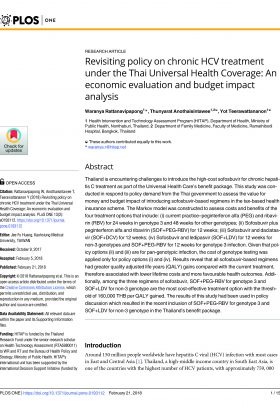This website uses cookies so that we can provide you with the best user experience possible. Cookie information is stored in your browser and performs functions such as recognising you when you return to our website and helping our team to understand which sections of the website you find most interesting and useful.
Revisiting policy on chronic HCV treatment under the Thai Universal Health Coverage: An economic evaluation and budget impact analysis

รายละเอียดเพิ่มเติม
Abstract
Thailand is encountering challenges to introduce the high-cost sofosbuvir for chronic hepatitis C treatment as part of the Universal Health Care’s benefit package. This study was conducted in respond to policy demand from the Thai government to assess the value for money and budget impact of introducing sofosbuvir-based regimens in the tax-based health insurance scheme. The Markov model was constructed to assess costs and benefits of the four treatment options that include: (i) current practice–peginterferon alfa (PEG) and ribavirin (RBV) for 24 weeks in genotype 3 and 48 weeks for other genotypes; (ii) Sofosbuvir plus peginterferon alfa and ribavirin (SOF+PEG-RBV) for 12 weeks; (iii) Sofosbuvir and daclatasvir (SOF+DCV) for 12 weeks; (iv) Sofosbuvir and ledipasvir (SOF+LDV) for 12 weeks for non-3 genotypes and SOF+PEG-RBV for 12 weeks for genotype 3 infection. Given that policy options (ii) and (iii) are for pan-genotypic infection, the cost of genotype testing was applied only for policy options (i) and (iv). Results reveal that all sofosbuvir-based regimens had greater quality adjusted life years (QALY) gains compared with the current treatment, therefore associated with lower lifetime costs and more favourable health outcomes. Additionally, among the three regimens of sofosbuvir, SOF+PEG-RBV for genotype 3 and SOF+LDV for non-3 genotype are the most cost-effective treatment option with the threshold of 160,000 THB per QALY gained. The results of this study had been used in policy discussion which resulted in the recent inclusion of SOF+PEG-RBV for genotype 3 and SOF+LDV for non-3 genotype in the Thailand’s benefit package.
Introduction
Around 150 million people worldwide have hepatitis C viral (HCV) infection with most cases in East and Central Asia [1]. Thailand, a high-middle income country in South East Asia, is one of the countries with the highest number of HCV patients, with approximately 759, 000 cases [2]. The prevalence of HCV infection is 2.8% which is increased to 8.4% in patients with Human Immunodeficiency Virus (HIV) infection in adults aged 21–60 years. In addition, Thailand is also found to have a unique HCV genotype 3 prevalence, although HCV genotype 1 is most common globally [3].
Chronic HCV infection can cause liver inflammation and tissue scarring which can lead to liver cirrhosis and hepatocellular carcinoma if untreated [4]. For HCV treatment, goal is to reduce mortality and morbidity from end-stage liver disease and hepatocellular carcinoma by achieving the virological cure, defined as sustained virological response (SVR).
Last 2011, Thai National List of Essential Medicines (NLEM), the pharmaceutical reimbursement list for the Universal Healthcare Coverage (UHC) scheme, introduced peginterferon alfa in combination with ribavirin for the treatment of chronic HCV infection. This was the first national policy supporting the treatment of chronic hepatitis C in Thailand which prompted an increase in access of Thai chronic HCV patients to the free treatment, although majority of the patients still remain undiagnosed.
Sofosbuvir, an oral nucleotide polymerase inhibitor, was approved by the US Food and Drug Administration (FDA) in December 2013 and subsequently by Thai FDA in 2015. American Association for the Study of Liver Diseases (AASLD) and World Health Organization (WHO) guidelines currently recommend Sofosbuvir-based regimens as the standard treatment of chronic HCV infection. The recommendation is found to have high efficacy rates in terms of increased SVR, shorter treatment duration and lower rate of adverse drug reaction compared to peginterferon alfa in combination with rivabirin [5]
The high cost of sofosbuvir is a major barrier in accessing the medicine in both resource-rich and resource-poor settings [6]. A patent-holder of sofosbuvir has entered licensing deals with several manufacturers in India who are developing generic versions of the drug, but the deals exclude majority of the middle- income countries, including Thailand [7].
In 2015, an appeal for reevaluation of the treatment policy for HCV was raised by physicians, civil society and patient groups to the Thai government. Consequently, Health Intervention and Technology Assessment Program (HITAP) was requested by the Subcommittee for Development of NLEM to assess the value for money and potential budget impact of sofosbuvir-based regimens compared to the currently included treatment under the Thai UHC such as peginterferon-based regimens.
Given the unique HCV infection genotype prevalence in Thailand, policy makers are particularly interested to assess whether sofosbuvir-based regimens signifies a better value for money for pan-genotypic treatment regimen compared to genotype-specific treatments, as the former could save cost of HCV genotype testing. Results of this study can benefit other low and middle income countries (LMICs) facing similar challenges in prioritising care for chronic hepatitis C patients.
Click here to access the publication:
http://journals.plos.org/plosone/article?id=10.1371/journal.pone.0193112#references




